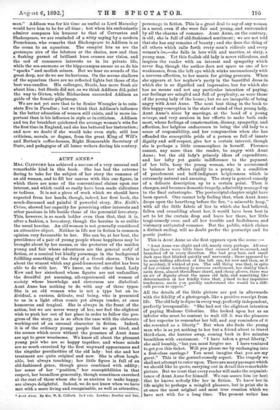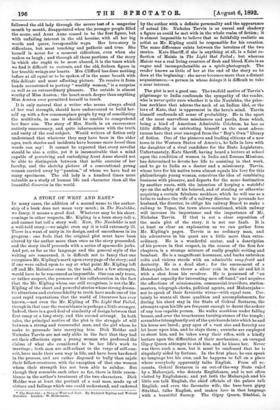AUNT ANNE.*
Mits. CLIFFORD has achieved a success of a very unusual and remarkable kind in this book. She has had• the extreme daring to take for the subject of her story the romance of an old woman, and to fill her canvas with this one figure, in which there are none of the conventional claims upon our interest, and which could so easily have been made ridiculous or tedious. It is not a piece of work which we should have expected from her hands, though, indeed, her first book, the much-discussed and painful if powerful story, Mrs. Keith's Crime, showed her capacity for perceiving other interests and other passions in life beside those of the perennial love-story. This, however, is so much bolder even than that, that it is, after a fashion, a love-story, though the heroine is so unlike the usual heroine. An old woman is not generally considered an attractive object. Neither in life nor in fiction is common opinion very favourable to her. She can be, at her best, the providence of a pair of young people whose happiness may be brought about by her means, or the protector of the maiden young and fair whose adventures are the general motif of fiction, or a comical but kindly personage in the background fulfilling something of the duty of a Greek chorus. This is about the utmost which any good-humoured novelist has been able to do with her. We know, on the other hand, Lady Kew and her sisterhood whose figuies are not unfamiliar, the dreadful yet amusing, all-experienced old women of society whose knowledge and cleverness are diabolical. Aunt Anne has nothing to do with any of these types. She is an old woman who is not a type but an in- dividual, a curious, delicate, real being, who is presented to us in a light often comic yet always tender, at once humorous and tragical. She is always in the front of the action, but we are never weary of her, nor feel the slightest wish to push her out of her place in order to follow the pro- gress of the story, as is so often the case with the elaborate working-out of an unusual character in fiction. Indeed, it is of the ordinary young people that we get tired, and the scenes which occur without the presence of Aunt Anne are apt to grow wearisome. We know all about the pleasant young pair who are so happy together, and whose minds are so much exercised by the first wayward appearances and the singular peculiarities of the old lady : but she and her treatment are quite original and new. She is often laugh- able, but always touching; her little figure is full of an old-fashioned grace, though grace combined with oddity; her sense of her "position," her susceptibilities in that respect, her boundless generosity, though sometimes exercised at the cost of those whom she is so anxious to make happy, are always delightful. Indeed, we do not know when we have met with a more living and recognisable, as well as attractive,
• Aunt Anne. By Mrs. W. K. Clifford. In 2 vole. London : Bentley and Son.
personage in fiction. This is a great deal to say of any woman in a novel, even if she were fair and young, and surrounded by all the charms of romance. Aunt Anne, on the contrary, is old; she is full of old-fashioned sentiment ; we are not told that she has any remains of beauty ; and she does the thing of all others which calls forth every man's ridicule and every woman's ire,—she falls in love with and marries, at sixty, a young man. Yet this foolish old lady is never ridiculous, and inspires the reader with an interest and sympathy which never flag, though the author does not spare us one of her weaknesses, from the left eye which winks unconsciously with a nervous affection, to her mania for giving presents. When she appears at her nephew's party in the beautiful dress in which she is so dignified and impressive, but for which she has no means and not any particular intention of paying,. our feelings are mingled and full of perplexity, as were those of the young lady of the house ; but we are incapable of being angry with Aunt Anne. The next best thing in the book to this happy conception is the state of mind of that young lady, Aunt Anne's niece by marriage, at the head of a young menage, and very anxious in her efforts to make both ends meet, whose feelings of consternation, dismay, sympathy, and affection, her helpless endeavours to bring the old lady to a sense of responsibility, and her compunction when she has offended the susceptible pride of a person so fall of innate dignity and self-respect, give her a certain interest, though she is perhaps a little commonplace in herself. Florence cannot, any more than the reader, be angry with Aunt Anne ; but the old lady's princely ideas of expenditure, and her lofty yet gentle indifference to the payment of her bills, keep the young woman, who is accustomed to balance her affairs rigidly to a penny, in a condition of puzzlement and half-indignant helplessness which is extremely natural and amusing. The story is genteel comedy of a delicate description up to a certain point. Then it changes, and becomes domestic tragedy, admirably managed up. to the final catastrophe. The postscriptal chapter might have been spared. One cannot help feeling that, when Aunt Anne drops upon the hearthrug before the fire, "a miserable heap,' with all the little fabric of lies in which she had believed, fallen and crumbling about her, it would have been best in art to let the curtain drop and leave her there, her little tragi-comedy over, and all her trouble and foolishness, and visionary antiquated romance. But the public, which claims a distinct ending, will no doubt prefer the postscript and its poetic justice.
This is Aunt Anne as she first appears upon the scene :—
"Aunt Anne was slight and old, nearly sixty perhaps. All over her face there were little lines that crossed and re-crossed, and branched off in every direction. She had grey hair, and small dark eyes that blinked quickly and nervously ; there appeared to• be some trifling affection of the left eye, for now and then, as if by accident, it winked at you. The odd thing was that, in spite • of her evident tendency to nervous excitement, her shabby black satin dress, almost threaabare shawl, and cheap gloves, there 1.79.3 an air of dignity about the spare old lady, and something like determination in her kindly voice that, joined to her impulsive tenderness, made you quickly understand she would be a diffi- cult person to oppose."
All the details of the little picture are put in afterwards with the fidelity of a photograph, like a positive rescript from
life. The old lady is digne in every way, perfectly independent, perfectly irresponsible. "She had not the slightest intention of paying Madame Celestine. She looked upon her as an inferior who must be content to wait till it was the pleasure. of her superior to remember her bill, and any reminders of it she resented as a liberty." But when she finds the young man who is as yet nothing to her but a friend abont to travel third-class, she hurries away, coming back in five minutes breathless with excitement. "I have taken a great liberty," she said humbly, "but you must forgive me. I have ventured
to get you this ticket. Will you please me by exchanging into a first-class carriage ? You must imagine that you are my guest." This is the genteel-comedy aspect. The tragedy we
shall not attempt to enter upon. There are many passages which we should like to quote, carrying out in detail this remarkable picture. But we trust that every reader will make the acquaint-
tance of Aunt Anne for himself. We can assure him for her) that he knows nobody like her in fiction. To know her in life might be perhaps a mingled pleasure, but in print she is at once the most original and most true creation which we have met with for a long time. The present writer has followed the old lady through the severe test of a magazine month by month, disappointed when the younger people filled the scene, and Aunt Anne ceased to be the first figure, but with unfailing interest in the old heroine, with all her big words and queer, irresponsible ways. Her love-story is ridiculous, but most touching and pathetic and true. She herself is never for a moment ridiculous, even when she makes us laugh ; and through all those portions of the story in which she ought to be most absurd, it is the tears which we find it difficult to restrain, and the old, forlorn figure in her trouble wrings our hearts. Mrs. Clifford has done nothing before at all equal or to be spoken of in the same breath with this delicate and most affecting picture. To receive it from hands accustomed to portray "worldly women," is a surprise as well as an extraordinary pleasure. The outside is almost worthy of Miss Austen ; the heart much deeper than anything Miss Austen ever permitted herself to touch.
It is only natural that a writer who seems always afraid of her real strength, should have endeavoured to build her- self up with a few commonplace people by way of conciliating the multitude, in case it should be unable to comprehend her finer aim. The story of Mrs. North is an excrescence entirely unnecessary, and quite inharmonious with the truth and unity of the real subject. Would writers of fiction only understand that whatever they may have been in the elder ages, such stories and incidents have become more banal than words can say ! It cannot be expected that every novelist should be also a critic, yet it is inconceivable that a mind capable of perceiving and embodying Aunt Anne should not be able to distinguish between that noble exercise of her faculty, and the sketchy picture of a conventional young woman carried away by "passion," of whom we have had BO many specimens. The old lady is a hundred times more valuable as a study of human life and character than all the beautiful divorcees in the world.



































 Previous page
Previous page